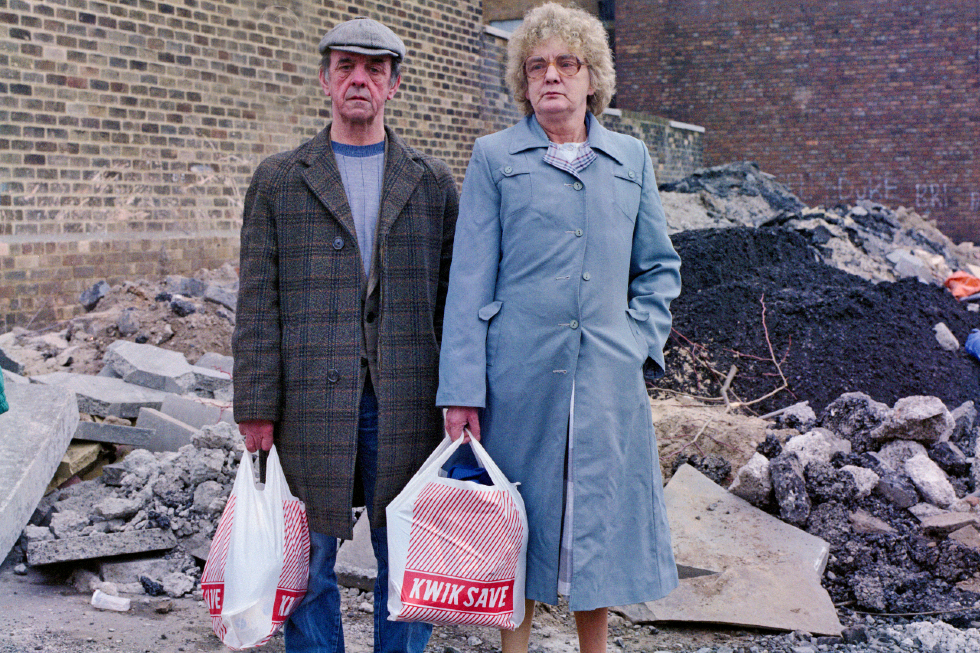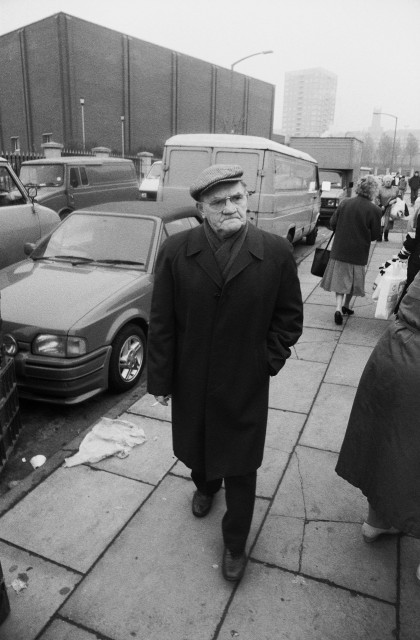“It was always going to be a Liverpool story” – A Conversation With Writer-Director Victoria Fayne

“I want this film to be a real love letter to the 90s.” Mike Pinnington speaks to writer-director Victoria Fayne about getting her new film and passion project, Local Hero, made…
“It was always going to be a Liverpool story.” I’m speaking over the phone with writer-director Victoria Fayne. Based in London but brought up in Liverpool, Fayne is excitedly telling me about Local Hero, her new, 1990s-set short film about a man named Charlie, left increasingly alone after the death of his wife, Rose. She tells me that the germ of the idea came more than six years ago, with a trip to the theatre. “I was at uni, I think I was in my final year”, she begins. “Some mates took me to see a play about this guy – [I remember] how crabby he was. He was such a great character and he reminded me so much of my Granddad, Sid – not that my Granddad was that crabby”, says Fayne, “but he just had a real thing about him.”
She then developed the character in a life-writing exercise. “But”, Fayne explains, “as I was writing it, something wasn’t quite right. My tutor thought I was making it a bit generic, and said ‘if your Granddad was scouse, make him scouse’”. This is how the story of Local Hero began, but also, necessarily, how it came to be set in and around where she – and her Granddad – had lived. “Suddenly, it became this story, a sort of alternative reality of ‘what if my Granddad had been in Anfield on his own?’ – he wasn’t, he’d moved to live with my parents by the time my nan had died – but, instead, what if he’d gone back to an empty house on his own?”
A busy freelancer in London, life got in the way and she ended up putting the script away for “years and years”. What factors made you revisit Charlie’s story to the point of developing it for the screen, I ask. “I pray for the day I just have one idea”, Fayne begins. “It would be lovely then to concentrate on it! But there’s always something else going on.” Sometimes, though, she qualifies, “I think that’s quite beneficial. You have the idea, then you put it away; and then with the influences you have, and things that happen, it becomes a more solid story. You start caring about your characters more. And the dialogue evolves and the place, and you think ‘what if, what if’. Once you’ve got that, then you start to get excited about bringing it to life.”
How, I wonder, did the initial idea come to be refined, especially its central character, Charlie. “I brought it out and had a read. I really liked the character but the script wasn’t right, so I worked on it for a bit; I really worked on the dialogue and brought in a few more characters and really brought out the comedy of it – it was really, really sad to start with. It got much funnier and I started really enjoying telling his story and giving him a solution to his loneliness.” Loneliness, of course, is an issue that’s really come to a head in lockdown and, agrees Fayne, “I think it has taken on new relevance; I think everybody can understand loneliness much better this year, because most people are experiencing it in some degree.”

To bring the project to life, and to do it properly, has meant consolidating the script with a crowdfunding campaign. “I wanted to do this really well because it means so much to me. I want to pay everyone well – you know, freelancers have had a terrible year, and film and TV’s taken a real battering. So, if people are gonna be involved, I want them to be paid for the work, y’know?” Recognising issues raised by the story, a percentage of donations to the crowdfunder will go to support the work of older people’s charity, Age UK. “We are putting some Age UK options in there as well, so people can choose to donate. What’s really come out of doing the research [for Local Hero] is that there’s a massive problem – I think there’s 1.4million chronically lonely older people, so we feel like we can’t make this film and not acknowledge that. I think of Charlie constantly in real life, especially at the moment.”
Back to the Charlie of Local Hero. In the wake of his wife’s death, he “resents people’s attempts” at coaxing him out of his insular world, and to offer their help. “He’d rather just be on his own”, Fayne explains. But, walking through the park one day, the man is jolted out of isolation as fate takes a hand. “He cuts through the park on the way back from the chemists, where he sees a kid fall into the water and start to drown”, she says. With nobody else around, it’s left up to him to jump in and save the grateful boy. “After that, I think it’s a new perspective on life for him, and, suddenly, he’s like, ‘Oh, gosh, I’m valuable to somebody again, and it just gives him a whole new lease of life.” Outside of familial ties, old and young people rarely have an opportunity to form friendships and, agrees Fayne, “[Charlie] would never go up and start talking to kids in the park, because he’d be expecting a negative response. But in this case, you have two human beings who just need each other, who think ‘actually, we’ve got more in common than we thought’”.
Other than her Granddad, I wonder, what have been the inspirations for Local Hero? “I was really influenced by I, Daniel Blake. I don’t think I’ve ever been so moved by a film before. I was absolutely floored by it; I cried so much, I couldn’t even watch the credits and I thought about it for weeks afterwards. I just find [director Ken Loach’s] work amazing and love how he gets you on the side of Daniel immediately. I think it’s brilliant.” In addition, she sites Shane Meadows’ The Virtues. “I love anything by him. [It’s not manipulative], you just come to love the characters organically, it’s beautiful.” And, also “Rocks, the Sarah Gavron film, that was hugely influential, because it’s just a kind of very working-class story about a bond between a brother and sister. I just really loved that very authentic bond.” Which, she says, “influenced how I wanted to show Charlie with the kids. I didn’t want it to be forced, I wanted it to be dead natural.”
Finally, I ask about expectations for the film and where we will, eventually, be able to see it. “We’re going to go for a Liverpool premiere once Covid gets out of the way!” And, Fayne, who tells me she’s “missed going to the cinema so much this year”, says it would be “lovely to see it on a cinema screen”. Failing that? “It would be really nice to see it [on the BBC or Film4], in company with other films all featuring older protagonists. If it just popped up on Channel 4”, she continues, “and got an audience who might think that they wouldn’t be interested in the story of an old man, but saw it and thought ‘oh, actually’ y’know?”
Mike Pinnington
Support the Local Hero crowdfunder now
With special thanks to Rob Bremner for use of photography





